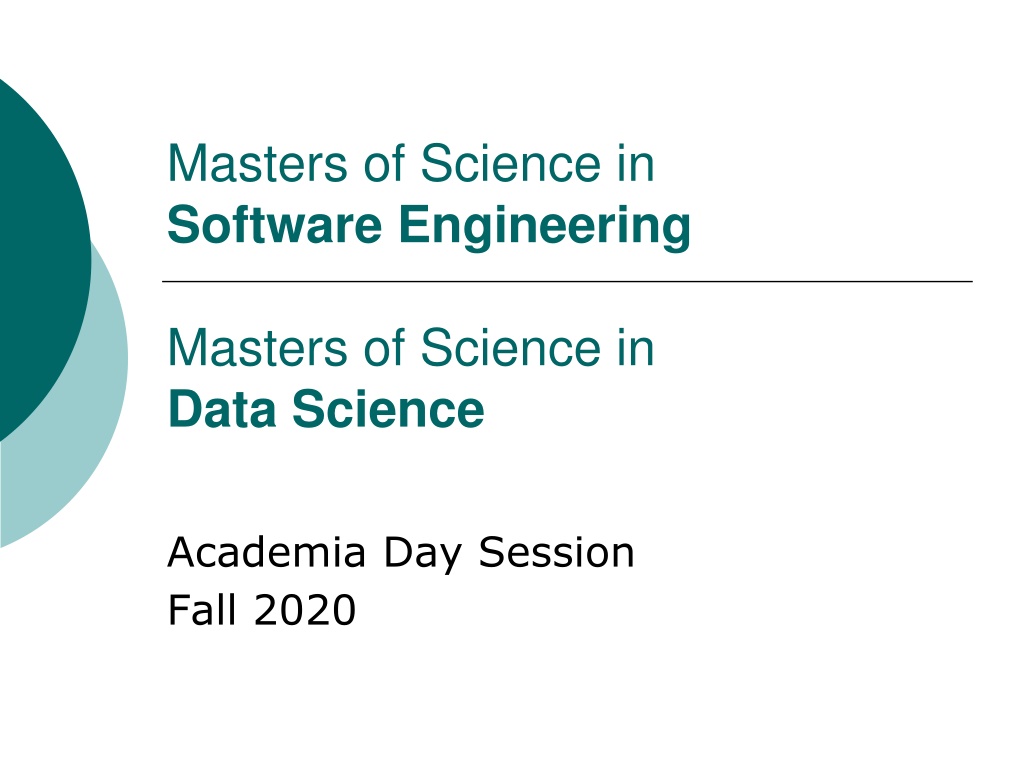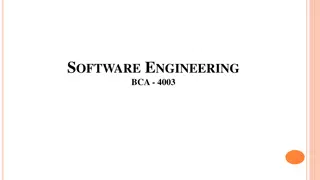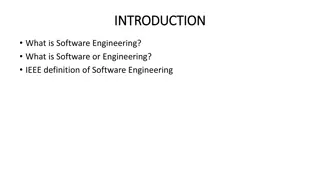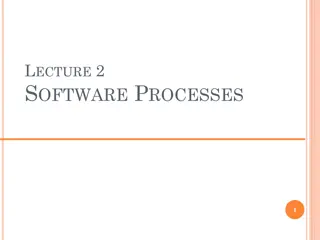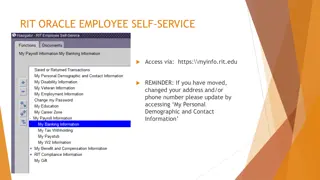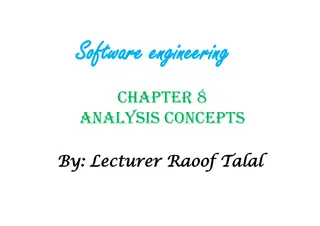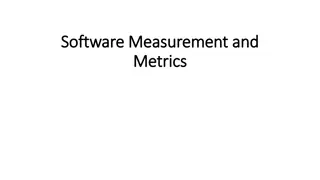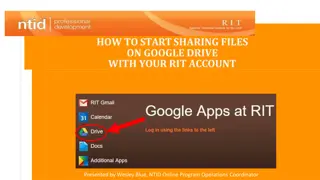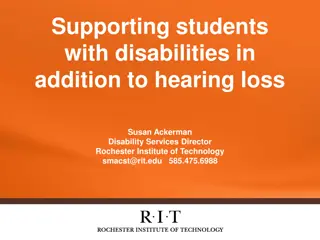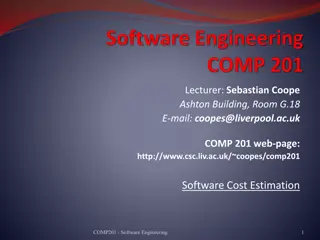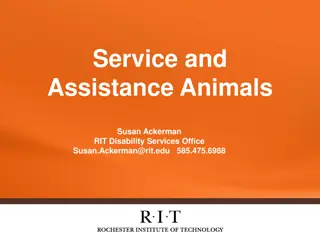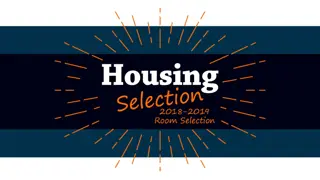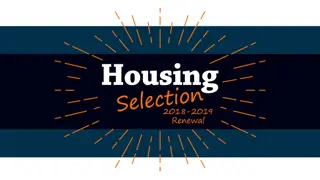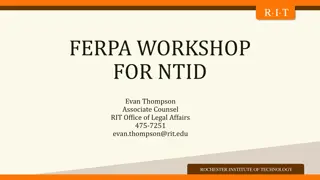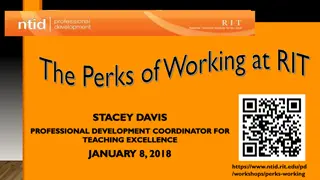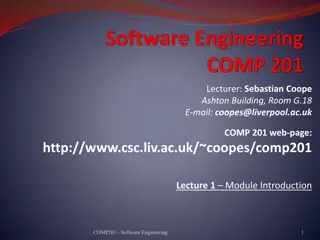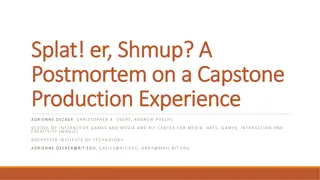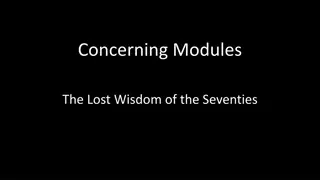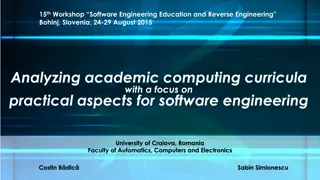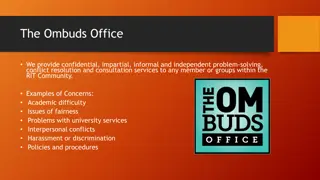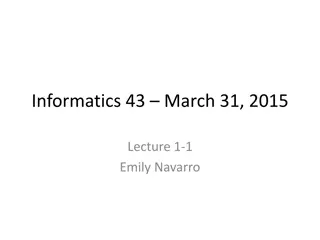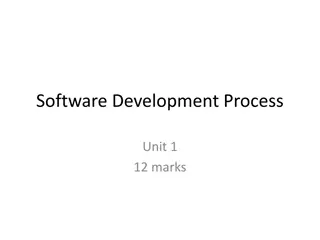Mastering Software Engineering and Data Science at RIT
Join the academic session at RIT to explore the Masters of Science programs in Software Engineering and Data Science. Discover the core content and unique overviews of each program, learn from faculty introductions, engage in open advising sessions, and understand the daily responsibilities of software engineers. Dive into the interdisciplinary approach of the Data Science program and the foundational knowledge provided by the Software Engineering curriculum. Be part of a dynamic learning environment that equips you with the skills needed in modern companies.
Download Presentation

Please find below an Image/Link to download the presentation.
The content on the website is provided AS IS for your information and personal use only. It may not be sold, licensed, or shared on other websites without obtaining consent from the author. Download presentation by click this link. If you encounter any issues during the download, it is possible that the publisher has removed the file from their server.
E N D
Presentation Transcript
Masters of Science in Software Engineering Masters of Science in Data Science Academia Day Session Fall 2020
Recording Note: this meeting is being recorded
Agenda 9:00-9:15 Fill out paperwork 9:15-9:30 Class introductions 9:30-10:30 Program overviews 10:30-10:45 Break 10:45-11:15 Faculty introductions 11:15-12:00 Open Advising (Software Eng. - Scott) 12:00-12:45 Open Advising (Data Science - Travis)
Student Introductions What is your name? Where you are from? Affiliated program (Software Engineering or Data Science) Why Software Engineering or Data Science at RIT?
Software Engineering Program Overview RIT was the first US university to offer the baccalaureate software engineering degree. Building on our leadership position in undergraduate software engineering education, we implemented the Master of Science degree in Software Eng. The program's core content ensures that graduates will possess both breadth and depth of SE knowledge.
Data Science Program Overview The MSDS is an interdisciplinary program, housed in the SE Department, but supported by GCCIS and the College of Science. The program's core content ensures that graduates will possess core DS skills such as statistics and machine learning, and the SE skills to be successful in modern companies. The on campus (albeit temporarily online) program has more focus on gaining applied data science knowledge and experience across a variety, as well as participation in research; as compared to the online version.
What Does it Mean to Engineer Software?
The software engineers daily job is to answer questions about the software system. How can I help the customer? What is required to solve the customer s problem? How will the user interact with the system? What operating system, language, hardware is going to be used? What is the overall software system structure and how do different components interact with each other? What code do I have to write? How do I organize my team so we are effective? Can we finish the software in time to support our publication deadline?
Engineering Disciplines Traditional engineering disciplines: Civil Engineering Mechanical Engineering Industrial Engineering Chemical Engineering Electrical Engineering More Specialized: Nuclear, Biomedical, Aerospace, Aeronautical, Environmental, Computer, Software
What is Software Engineering All About? Creating useful, high quality, cost-effective software solutions for individuals and industry Define What problem are we solving? Can we solve it with software? Design What components do we need? How do they interact? Buy them, build them, or use a special purpose framework? Develop Flesh out details coding Test resulting program Debug and repair flaws Deliver Distribution and installation User documentation Developer documentation Maintenance: fix, extend, integrate
A software engineering program should be a balance of areas in the computing realm
The ACM, AIS, IEEE-CS Computing Curricula 2005 Overview used diagrams to explain the range of computing disciplines 2020 draft includes Data Science and others
What Does it Mean to Be A Data Scientist?
The data scientist's daily job is to understand and create actionable information from data. How do I clean my data to make it machine readable/usable? How do I store my data to make it secure and appropriately/easily accessible (big data)? What kind of data do I have and what is my approach (unsupervised, semi-supervised, supervised)? What algorithms should I use to get the information I need? How can I make my analysis as efficient as possible (distributed/high performance computing)? How can I visualize and explain the data and my results?
Applied Domains A good data scientist should have the core knowledge to successfully apply their data science skills to a wide range of applied domains, but it can be beneficial to specialize. Example Data Science Specializations: Bioinformatics Computational Finance Business Analytics Computer Vision Time Series Data Analytics Software Engineering
What is Data Science All About? Data science is a multi-disciplinary field that uses scientific methods, processes, algorithms and systems to extract knowledge and insights from structured and unstructured data. -- https://en.wikipedia.org/wiki/Data_science Pre-processing Data sanitization Storage Big Data Database Systems Data Security Computing: Parallel / Multi-threaded Distributed High-Performance Custom Hardware (GPUs) Analysis/Analytics Artificial Intelligence Machine Learning Statistics Clustering / Unsupervised Learning Visualization Knowledge of visualization tools/frameworks Types of visualizations
The College: GCCIS Golisano College of Computing and Information Sciences Founded July 2001 Dean: Dr. Anne Haake www.gccis.rit.edu/anne-haake 17
The College: GCCIS Department of Software Engineering Professor and Chair: Naveen Sharma Houses Software Engineering program Data Science program (on campus) https://www.linkedin.com/in/nsharma2 18
The College continued Departments Software Engineering Including Data Science Computer Science Computer Security Information Sciences and Technologies Including Human Computer Interaction, Networking and Systems Administration, and on-line Data Science School of Interactive Games & Media Ph.D. Program 19
SE Program Overview 36 semester credit hours 4 semester program Co-op is optional but encouraged Courses are a mixture of hands-on projects and research Thesis or Capstone option
D e p a r t m e n t o f S o f t w a r e E n g i n e e r i n g G R A D U A T E C U R R I C U L U M S O F T W A R E E N G I N E E R I N G P R O G R A M Course Sequence v 3.2 Last Updated: March 3, 2020 Year Two Thesis Track Fall Year One Year Two Ca pstone Track Fall Fall Spring Spring Spring Software Quality Assurance Capstone Project Software Construction Software Architecture Software Architecture Thesis SWEN-777 (3) SWEN-780 (3) SWEN-601 (3) SWEN-790 (6) SWEN-755 (3) SWEN-755 (3) Collaborative Software Development Collaborative Software Development Foundations of SE Research Methods Elective Elective SWEN-732 (3) SWEN-640 (3) SWEN-610 (3) SWEN-732 (3) (3) (3) Independent Study Model-Driven Development Elective Elective SE Elective SWEN-799 (3) SWEN-746 (3) (3) (3) (3) Current Software Engineering Electives Key Software Engineering Courses Engineering Self-Adaptive SW Systems Engineering Accessible Software Thesis Track Capstone Track Course Name SWEN-711 (3) SWEN-712 (3) Electives Course Number (Credits) Engineering Cloud SW Systems SWEN-614 (3) For a list of pre-approved electives from other programs, see https://www.se.rit.edu/graduate/approved-electives Please submit an Elective Approval form, even for pre-approved electives.
DS Program Overview 30 semester credit hours 3 semester program Co-op is optional but encouraged Courses are a mixture of hands-on projects and research Thesis or Capstone option
DS Curriculum Flowchart (Three Semester)
DS Curriculum Flowchart (Four Semester)
Introductions Graduate Program Faculty Naveen Sharma SE Department Chair Scott Hawker SE Grad Program Director Travis Desell DS Grad Program Director Mihail Barbosu - DS Assoc. Program Director Dan Krutz SE Faculty Andy Meneely SE Faculty Mehdi Mirakhorli SE Faculty Mohamed Wiem Mkaouer SE Faculty Christian Newman- SE Faculty Qi Yu - IST/DS Faculty Zhe Yu - DS Faculty Robert Parody - Applied Statistics/DS Faculty
SE and DS Research Areas Broad View Faculty Research Areas Andy Meneely Engineering Secure Software Systems | Empirical Software Engineering Dan Krutz Mobile Security/Privacy | Mining Software Repositories | Software Engineering Education Mehdi Mirakhorli Application of Machine Learning to Software Architecture | Software Traceability and Software Security Mohamed Wiem Mkouer Search-based Software Engineering | Software Refactoring and Re-modularization | Bug Management Naveen Sharma Self-* and adaptive software system for immune/resilient infrastructure | Urban data science and software applications Scott Hawker Software Process Mining | Model-Driven Software Development Christian Newman Source code analysis and transformation Travis Desell Data Science | High-performance & distributed computing | Machine learning Mihail Barbosu Mathematics | Statistics Robert Parody Applied Statistics Qi Yu Machine Learning Zhe Yu Machine Learning | Information Retrieval | Human-Centered Software Engineering
SE Computer Account GCCIS has consolidated its system administration support (gccsit@rit.edu) You will be assigned a departmental account Can use it in SE classrooms, labs, team rooms Print Quota Storage Quota Team Room Access
Codes & Abbreviations to Know SE DS Software Engineering Data Science Golisano College of Computing & Information Sciences GCCIS SWEN or DSCI Program Codes 6 Year level
Contacts Who to contact Britt Stanford and Dawn Smith: Administrative issues Scott: Academic/Career issues in SE Travis: Academic/Career issues in DS Kurt & Arnela: Computer Account Issues gccisit@rit.edu Messages from the Department: RIT email
Department Facilities Studio Labs/Classrooms Team Rooms CoLab Mentoring Lab (Society of Software Engineers) PhD Lab Shared space with Information Systems Primary: GOL 2670 Secondary: either GOL 2130 (Networking lab) or GOL 2320 (Sys Admin lab) when they are not being used for classes Faculty and Staff Offices
Classroom Protocol When you come to class, *wait for the prior class to leave* before entering. Please don't congregate in the hall. Try not to arrive till 5 minutes before class. For students in class, please leave the room when class ends, so we have time for crowds to clear out. Clean off the computer when you sit down, and clean it off again before you leave Please don't congregate in the halls, or in class after class-time If you come to class without a mask, you will be given a disposable mask or asked to leave the room I know this is hard and this is inconvenient; but this is the right thing to do!
Curriculum Plan of Study Follow the curriculum flow chart Meet with Dr. Hawker or Dr. Desell to discuss your goals and determine your courses You can revise your selections Within constraints
Recent Electives More graduate faculty results in more elective opportunities Software Engineering Methods in Data Science Engineering Self-Adaptive Software Systems Engineering Cloud Software Systems
New DS Electives DSCI-789: Neural Networks for Data Science DSCI-650: High Performance Data Science
Curriculum Electives Must be approved Course number 600 or greater to count Grade must be a C or greater to count C- is not a C Elective courses typically from SE, DS, CS, CE, HCI, IST, Management (BUSI) DS Elective courses can also include specializations from applied domains. Pre-approved list is on-line You can lobby for courses not on the pre- approved list Either way, fill out an Elective Approval form
Curriculum Optional Co-op Can be after 18 on-campus credits What is a co-op? When can I take it? How do I find one?
Grading You must maintain a grade point average >= 3.0 You must obtain at least a C in every graduate course A C- is a failing grade The GPA is calculated on ALL courses, including bridge; 36 (SE) or 30 (DS) credits used for certification Repeating a graduate course does not replace the grade
SE Curriculum: Capstone or Thesis Taken at the end of your program Thesis: 6 credit-hour research experience with a faculty advisor and committee Capstone: 3 credit-hour hands-on experience with a faculty advisor Process starts the second semester with SWEN 640 Research Methods Topic proposal, with literature review Locate advisor and committee* Refer to Graduate Student Handbook for further details
DS Curriculum: Capstone or Thesis Can decide before third semester. Capstone: Is developed as part of the Applied Data Science Project course sequence (ADS I, II, III and directed study) with a faculty advisor - begins your first semester. Thesis: An additional 3 credit-hours of thesis credit can be taken in place of an elective in the last semester to extend your applied data science project into a full MS thesis. Refer to Graduate Student Handbook for further details.
Course Registration Process 1. Know your registration date 2. Meet with Scott or Travis 3. Submit applicable forms Elective Approval Form Independent Study Form Capstone or Thesis Registration Form Capstone or Thesis Continuation Form 4. Register online using SIS/Tiger Center
Registration Tips Don t put off registration . courses may fill up quickly Most SE/DS courses are offered only once per year . make sure you stay on track Use the flowchart to track your progress
Add/Drop and Withdrawing Add/Drop First week of classes Changed courses will not be recorded on your transcript Withdrawal After add/drop, you can withdraw from a course (consult the academic calendar) You will receive a grade of W on your transcript
Other Policies & Procedures Academic Probation Academic Honesty 7-Year Rule
Scheduling Appointments Preference: During posted open office hours Contact the front desk or send an email to schedule an appointment No same day appointments Sample advising topics: Registration Plan of Study Worksheet Review Leave of Absence/University Withdrawal Course Withdrawal Academic Difficulty Graduation/Remaining Requirements Schedule Planning/Changes Change of Program Out Full-time Equivalency (FTE) Co-op
How to Connect- Advisor/Advisee Etiquette Be patient and respectful Include your first name, last name, and University ID in email Write professional, business-quality emails Plan ahead emailing the night before a deadline will not guarantee a prompt response Do not consult your friends/peers for advising matters Arrive to appointments on time
How to Connect - Resources Graduate Director and Faculty Staff Tutoring Center Academic Support Center Campus Writing Commons Graduate Meetings/Workshops Email Graduate Studies, International Student Services, Health Center, etc. Office hours
Timing Is Everything - Full-time Status Full-time students must register for and successfully complete nine or more credit hours per semester If you fall below nine credits by dropping or withdrawing from a course, your scholarship, financial aid, student loans, and student visa (if any are applicable to you) will be affected in future terms See Prof. Hawker or Prof. Desell before you do anything that will change your status
Helpful Hints Full-time Status Withdrawing/Dropping a course is NOT always possible Full-time equivalency: course load credit for graduate work, such as a paid graduate assistantship or a paid research assistantship You may use only two. It is important you use them wisely so you will have ample time to complete your degree Intersession and summer terms are considered breaks in which you are not required to be enrolled Can be less than full-time during last semester
Timing Is Everything- Application For Graduation Registrar emails all grad students beginning their first semester inviting them to Apply for Graduation on the system Apply TWO TERMS before you complete the program
